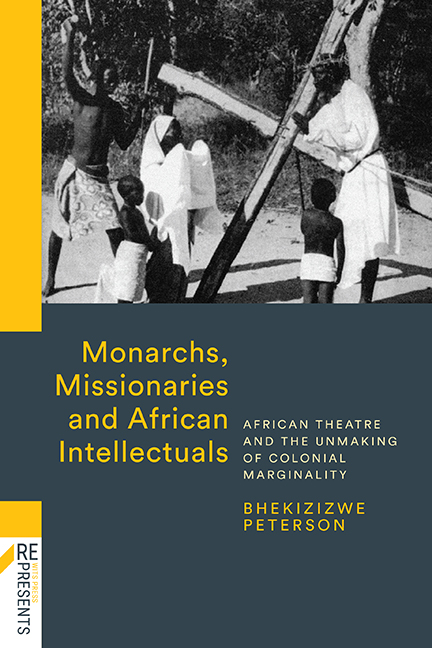 Monarchs, Missionaries and African Intellectuals
Monarchs, Missionaries and African Intellectuals Book contents
- Frontmatter
- Dedication
- Contents
- Preface and Acknowledgements
- Note on Zulu Orthography
- Introduction: Staging the (Alien)nation: African Theatre and the Colonial Experience
- 1 ‘All Work and No Play Makes Civilisation Unattractive to the Masses’: Theatre and Mission Education at Mariannhill
- 2 ‘I Will Open My Mouth in Parables’:Accounting for the Crevices in Redemption
- 3 Parallel Time, Parallel Signs, Discordant Interpretations
- 4 B.W. Vilakazi and the Poetics of the Mental War Zone
- 5 The Bantu Men’s Social Centre: Meeting the Devil on his own Ground
- 6 The Bantu Dramatic Society According to a Gossip Columnist
- 7 Contesting ‘The Bantu Imagination’: The British Drama League & The New Africans
- 8 H.I.E. Dhlomo: Measuring the Distance Between Armageddon and Revolution
- 9 ‘The Black Bulls’: Assembling the Broken Gourds
- 10 Hegemony and Identity: What a Difference ‘Play’ Makes
- Notes
- Bibliography
- Index
Preface and Acknowledgements
Published online by Cambridge University Press: 12 October 2021
- Frontmatter
- Dedication
- Contents
- Preface and Acknowledgements
- Note on Zulu Orthography
- Introduction: Staging the (Alien)nation: African Theatre and the Colonial Experience
- 1 ‘All Work and No Play Makes Civilisation Unattractive to the Masses’: Theatre and Mission Education at Mariannhill
- 2 ‘I Will Open My Mouth in Parables’:Accounting for the Crevices in Redemption
- 3 Parallel Time, Parallel Signs, Discordant Interpretations
- 4 B.W. Vilakazi and the Poetics of the Mental War Zone
- 5 The Bantu Men’s Social Centre: Meeting the Devil on his own Ground
- 6 The Bantu Dramatic Society According to a Gossip Columnist
- 7 Contesting ‘The Bantu Imagination’: The British Drama League & The New Africans
- 8 H.I.E. Dhlomo: Measuring the Distance Between Armageddon and Revolution
- 9 ‘The Black Bulls’: Assembling the Broken Gourds
- 10 Hegemony and Identity: What a Difference ‘Play’ Makes
- Notes
- Bibliography
- Index
Summary
The completion of this book coincides with the end of the first five-year cycle of democratic rule in South Africa. The installation of the first democratically elected government in South Africa in 1994 was an overdetermined event. It ushered in an historical phase profoundly saturated with contending hopes, aspirations and fears, all loosely held together by the idea that the society is experiencing a ‘transition’. The tensions and hesitancies that currently typify the political and economic spheres are no less apparent in the realm of the cultural imagination. Here, there is the urgent need to create the collective myths that are to guide the country into the future. The task is to transform abstract ideas and emotions like ‘patriotism’, ‘nation’ and ‘independence’ into concrete, tangible forms and lived, felt experiences. Nowhere is such an enterprise more discernable than in the aura and controversy that surrounds the popular notion of the country being a ‘rainbow nation’. The metaphor of the ‘rainbow nation’ bears eloquent testimony to the pivotal role played by narrative as a primary cognitive tool for imagining the nation. Likewise, much that passes for scientific, economic and political writing on ‘nation building’, ‘reconstruction and development’, ‘reconciliation’, ‘identity’, ‘unity and diversity’, and so on, is fundamentally premised on the use of narratorial strategies.
As I hope this book will demonstrate, many of the anxieties that we are experiencing today are similar in many respects to the battles and visions of African intellectuals and artists at the turn of the century. There is much in the writings of Sol T. Plaatje, B.W. Vilakazi, H.I.E. Dhlomo and others that anticipates contemporary debates over issues like alterity and hybridity, memory, history and the politics of theatre.
At last I have the chance to thank the many people who assisted me and to give credit where it is long overdue. I now intend to keep my distance as promised, at least for a while.
My heartfelt appreciation to the staff at the Mariannhill Monastery, in particular Sister Adelgista, now sadly departed, and Father Bernard Pagitsch (Superior), both of whom were kind enough to grant me access to material in the Mariannhill archives.
- Type
- Chapter
- Information
- Monarchs, Missionaries and African IntellectualsAfrican Theatre and the Unmaking of Colonial Marginality, pp. ix - xiiPublisher: Wits University PressPrint publication year: 2021


